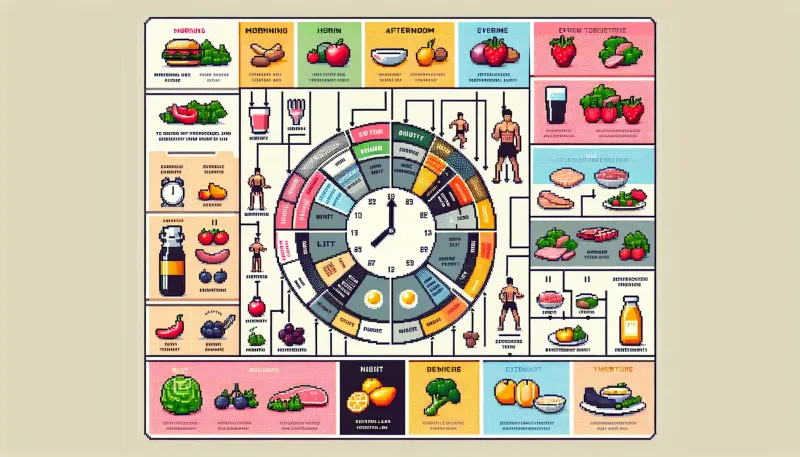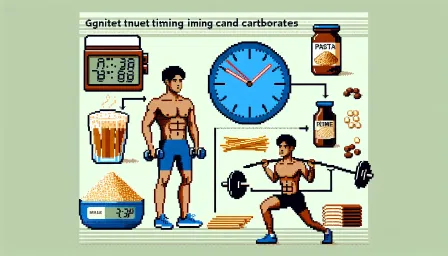The Ultimate Guide to Nutrient Timing and Weight Loss: Maximize Your Results

Learn about the importance of nutrient timing in weight loss. Discover how to optimize your meal schedule to maximize results.
Nutrient timing, an often-overlooked aspect of diet, plays a critical role in optimizing weight loss and overall fitness results. Understanding when and what to eat can profoundly impact your body's metabolism and its ability to burn fat. In this ultimate guide, we'll delve into the science behind nutrient timing, explore effective strategies, and provide practical tips to help you achieve your weight loss goals.
What is Nutrient Timing?
Nutrient timing refers to the strategic distribution of food intake, especially proteins, carbohydrates, and fats, around your workout schedule and daily activities. The crux of nutrient timing is eating the right nutrients at the right time to ensure that your body has what it needs for energy, recovery, and growth.
Why is Nutrient Timing Important for Weight Loss?
For weight loss, nutrient timing can be crucial. By timing your meals and snacks appropriately, you can:
- Enhance body composition by promoting fat loss while preserving muscle mass.
- Improve workout performance and recovery, making you more consistent in your exercise regimen.
- Regulate blood sugar, which helps control hunger and reduce cravings.
Key Strategies for Effective Nutrient Timing
1. Pre-Workout Nutrition
Eating before a workout ensures you have enough energy to perform at your best. A combination of protein and complex carbohydrates consumed about 1-2 hours before exercise can enhance performance and endurance. For instance, a meal of oatmeal with a scoop of protein powder is an excellent pre-workout option.
2. Post-Workout Nutrition
Post-workout is a critical time for nutrient intake, often referred to as the "anabolic window." Consuming protein and fast-digesting carbohydrates within 30-60 minutes after exercising aids in muscle recovery and glycogen replenishment. A protein shake with banana is a quick and effective choice.
3. Meal Frequency and Distribution
Frequent, evenly spaced meals can help maintain energy levels and prevent overeating. Aim for 3 main meals and 2-3 snacks per day, emphasizing nutrient-dense foods. This approach helps keep your metabolism active and supports steady blood sugar levels.
4. Macronutrient Balance
The balance of proteins, carbohydrates, and fats in each meal is critical for sustained energy release and satiety. An example of a balanced meal could include grilled chicken (protein), quinoa (carbohydrate), and avocado (healthy fat).
Practical Tips for Implementing Nutrient Timing
Plan and Prep Your Meals
Preparation is key to adherence. Spend time each week planning and prepping your meals to ensure you stick to your nutrient timing plan.
Stay Hydrated
Hydration is often neglected in nutrient timing. Ensure you're drinking enough water throughout the day, especially in relation to your workout times.
Listen to Your Body
While guidelines are helpful, individual responses can vary. Pay attention to how your body feels before and after you eat certain foods to fine-tune your nutrient timing strategy.
Common Misconceptions About Nutrient Timing
There are several myths surrounding nutrient timing:
1. "Timing is Everything"
While nutrient timing is important, overall diet quality, calorie balance, and consistency are equally crucial for weight loss.
2. "Carbs at Night Make You Fat"
Consuming carbohydrates at night does not inherently lead to weight gain. The primary concern should be your total calorie intake and nutritional balance over time.
Conclusion
Nutrient timing can significantly enhance your weight loss efforts when executed correctly. By strategically planning pre- and post-workout meals, balancing macronutrients, and maintaining a consistent eating schedule, you can optimize your metabolism and performance. Remember, the key is to customize these strategies to fit your lifestyle and listen to your body's signals. Implementing these principles will not only help you lose weight but also improve your overall health and fitness.
© 2024 The Ultimate Guide to Nutrient Timing and Weight Loss. All Rights Reserved.



























